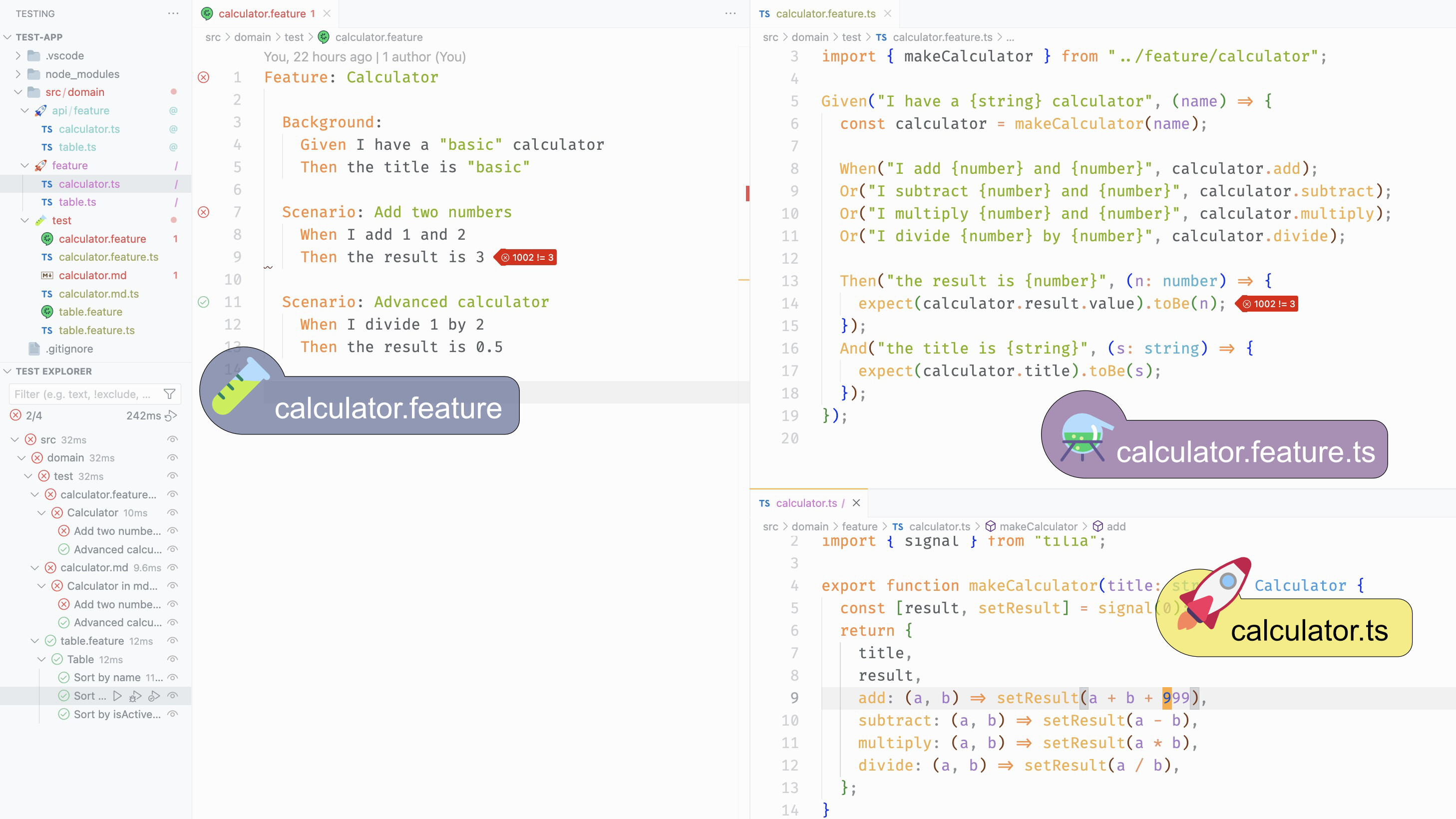Gherkin test runner for vitest.
The goal is to provide a simple and intuitive way to write tests for your application. Use with vitest and Gherkin extensions for VS-Code.
Tests can run in parallel (no shared state) and are fast and hot reloadable.
Features
- write with Gherkin, execute with vitest !
- async tests
- concurrent testing
- failed tests in steps definitions and Gherkin
- supports number, string and table parameters
- steps are explicitly linked to your context (easy to trace usage)
- supports "Background"
- experimental "Gherkin in markdown"
- ESM and CJS projects support
- Gherkin parsing with @cucumber/gherkin.
pnpm i --save-dev vitest-bdd
Create a vitest config file
// vitest.config.ts
import { defineConfig } from "vitest/config";
import { vitestBdd } from "vitest-bdd";
export default defineConfig({
plugins: [vitestBdd()],
test: {
include: ["**/*.feature", "**/*.spec.ts"],
},
});Define your feature in a file with the .feature extension:
# src/domain/test/calculator.feature
Feature: Calculator
Scenario: Add two numbers
Given I have a "basic" calculator
When I add 1 and 2
Then the result is 3
Scenario: Advanced calculator
Given I have an "rpn" calculator
When I enter 1
And I enter 2
And I divide
Then the result is 0.5Create a steps file with .feature.ts extension (and exact same name as
the feature file):
// src/domain/test/calculator.feature.ts
import { type Signal } from "tilia";
import { expect } from "vitest";
import { Given, type Step } from "vitest-bdd";
import { makeCalculator } from "../feature/calculator";
// You can reuse steps in multiple contexts
// Here anything that has a result value.
function resultAssertions(Then: Step, calculator: { result: Signal<number> }) {
// We define an async step, just to look cool 😎.
Then("the result is {number}", async (n: number) => {
await calculator.proccessBigComputation();
expect(calculator.result.value).toBe(n);
});
}
// You can use any variable name instead of When, And, and Then to match the
// language of the Gherkin messages, such as { Quand, Alors, Et }, etc. We show
// the code in an async situation (because it's the most difficult to handle).
Given("I have a {string} calculator", async ({ When, And, Then }, type) => {
switch (type) {
case "basic": {
const calculator = basicCalculator();
When("I add {number} and {number}", calculator.add);
And("I subtract {number} and {number}", calculator.subtract);
And("I multiply {number} by {number}", calculator.multiply);
And("I divide {number} by {number}", calculator.divide);
resultAssertions(calculator);
break;
}
case "rpn": {
const calculator = rpnCalculator();
When("I enter {number}", calculator.enter);
And("I enter {number}", calculator.enter);
And("I divide", calculator.divide);
resultAssertions(calculator);
break;
}
default:
throw new Error(`Unknown calculator type "${type}"`);
}
});You can reuse steps in multiple contexts. For example, a preference manager
could implement the interface Form (to access and set values) and you can
reuse the form steps:
// src/domain/test/preference-manager.feature.ts
import { formSteps } from "@steps/form";
Given("I have a preference manager", ({ Step }) => {
const preferenceManager = makePreferenceManager();
formSteps(Step, preferenceManager);
});src/domain/test/some.md
# Feature: Calculator in md
## Background:
- Given I have a "basic" calculator
- Then the title is "basic"
## Scenario: Add two numbers
- When I add 1 and 2
- Then the result is 3
## Scenario: Advanced calculator
- When I divide 1 by 2
- Then the result is 0.5
And this is some more markdown that does nothing.Define steps in src/domain/test/some.md.ts
src/domain/test/tabular.feature
Feature: Table
Background:
Given I have a table
| firstName | lastName | isActive |
| Charlie | Smith | true |
| Bob | Johnson | false |
| Alice | Williams | true |
Scenario: Sort by name
When I sort by "lastName"
Then the table is
| firstName | lastName | isActive |
| Bob | Johnson | false |
| Charlie | Smith | true |
| Alice | Williams | true |
# etc// src/domain/test/tabular.feature.ts
import { Given, Then, When } from "vitest-bdd";
import { makeTable } from "../feature/table";
Given("I have a table", ({ When, Then }, data) => {
// data : string[][]
const table = makeTable(data);
When("I sort by {string}", table.sort);
Then("the table is", (data) => {
expect([table.headers.map((h) => h.name), ...table.rows.value]).toEqual(
data
);
});
});You can write your tests in any language supported by Cucumber (around 40).
# language: fr
# /some/feature/calculator.feature
# language: fr
Fonctionnalité: Calculatrice
Scénario: Addition de deux nombres
Soit une calculatrice
Quand j'ajoute 15 et 10
Alors le résultat doit être 25
Scénario: Addition de nombres négatifs
Soit une calculatrice
Quand j'ajoute -15 et -10
Alors le résultat doit être -25
Scénario: Soustraction de deux nombres
Soit une calculatrice
Quand je soustrais 5 à 12
Alors le résultat doit être 7And the steps file:
// /some/feature/calculator.feature.ts
import { expect } from "vitest";
import { Given } from "vitest-bdd";
import { makeCalculator } from "../feature/calculator";
Soit("un calculator", ({ Quand, Alors }) => {
const calculator = makeCalculator();
Quand("j'ajoute {number} et {number}", calculator.add);
Quand("je soustrais {number} à {number}", calculator.subtract);
Alors("le résultat doit être {number}", (expected: string) => {
expect(calculator.result.value).toBe(expected);
});
});Don't forget to update some vscode settings (if you use cucumber autocomplete VS Code Extension):
// .vscode/settings.json
{
"workbench.iconTheme": "diagonal-architecture-light-icon-theme",
"cucumberautocomplete.steps": ["src/domain/test/**/*.feature.ts"],
"cucumberautocomplete.formatConfOverride": {
"Fonctionnalité": 0,
"Scénario": 1,
"Soit": 2,
"Quand": 2,
"Alors": 2
},
"cucumberautocomplete.strictGherkinCompletion": true,
"cucumberautocomplete.smartSnippets": true,
"cucumberautocomplete.syncfeatures": "src/domain/test/**/*.feature"
}And finally, here are some nice extensions for VS Code that can support your BDD journey:
- The Cucumber auto-complete extension adds syntax support and auto-complete for Gherkin.
- The diagonal architecture extension helps structure projects and has icons for
.featureand.feature.ts.
{
"recommendations": [
"midasum.diagonal-architecture",
"alexkrechik.cucumberautocomplete"
]
}Complete changelog is available here. Changelog is in reverse time order (latest at the top).
-
0.1.0: Canary version
-
Add async support
-
Add concurrency support
-
Fixed negative number parsing
-
Added support for scientific number notation
-
Create basic plugin
